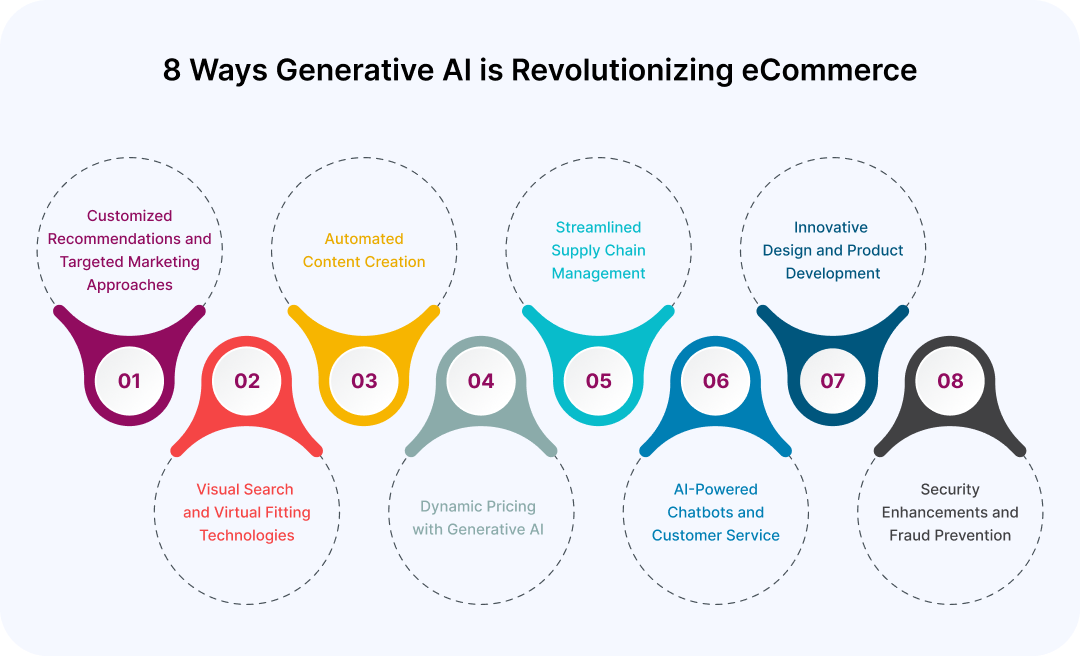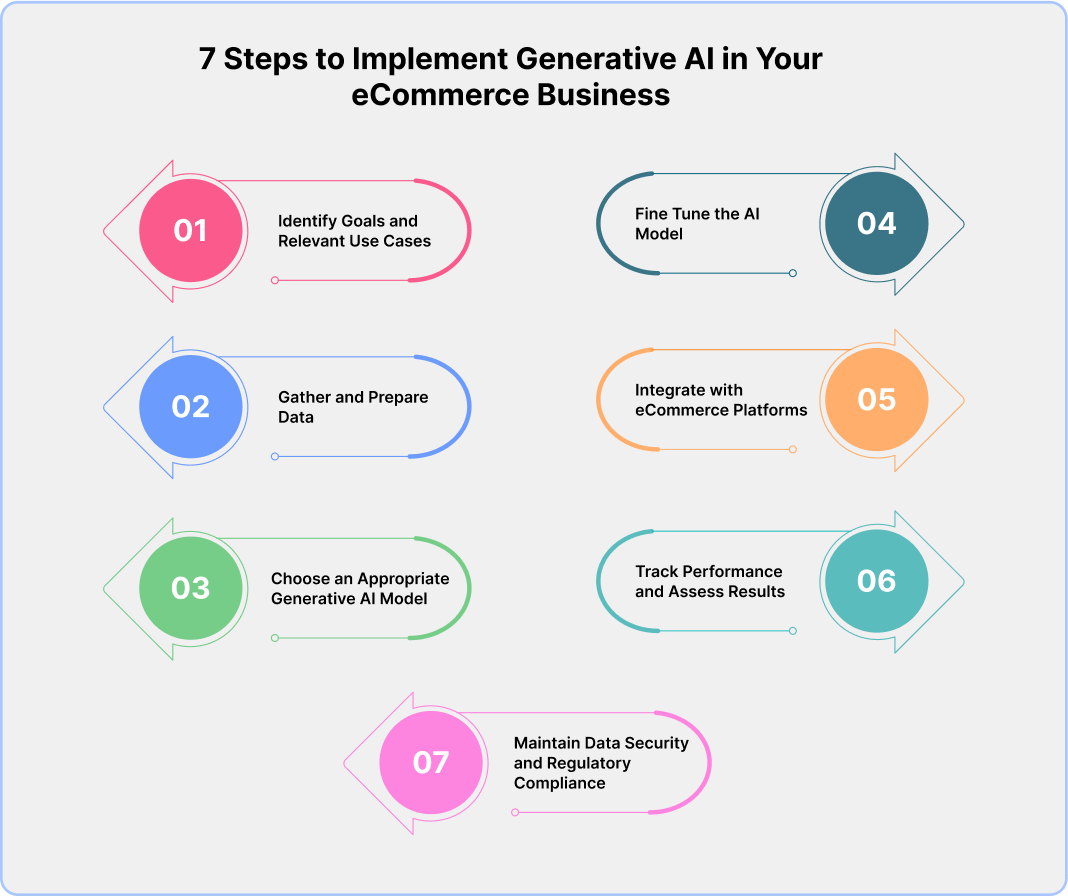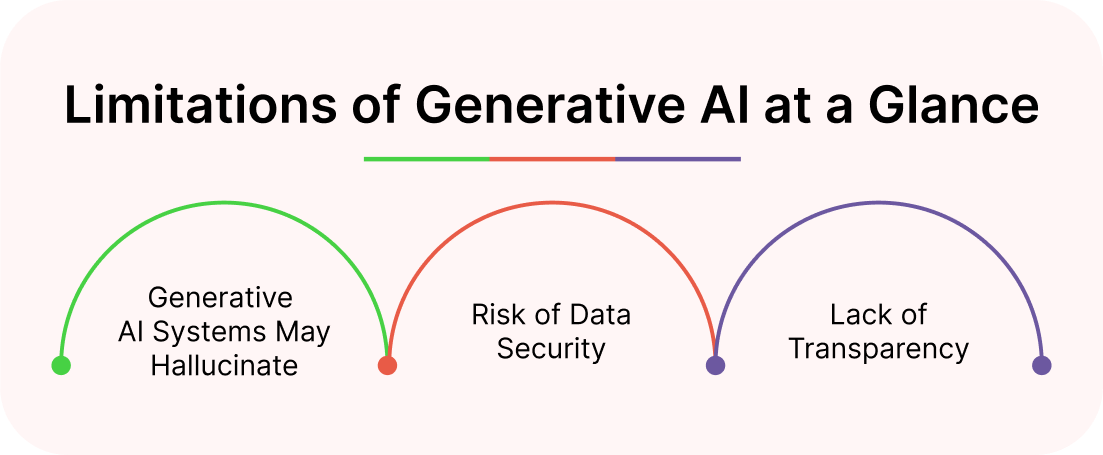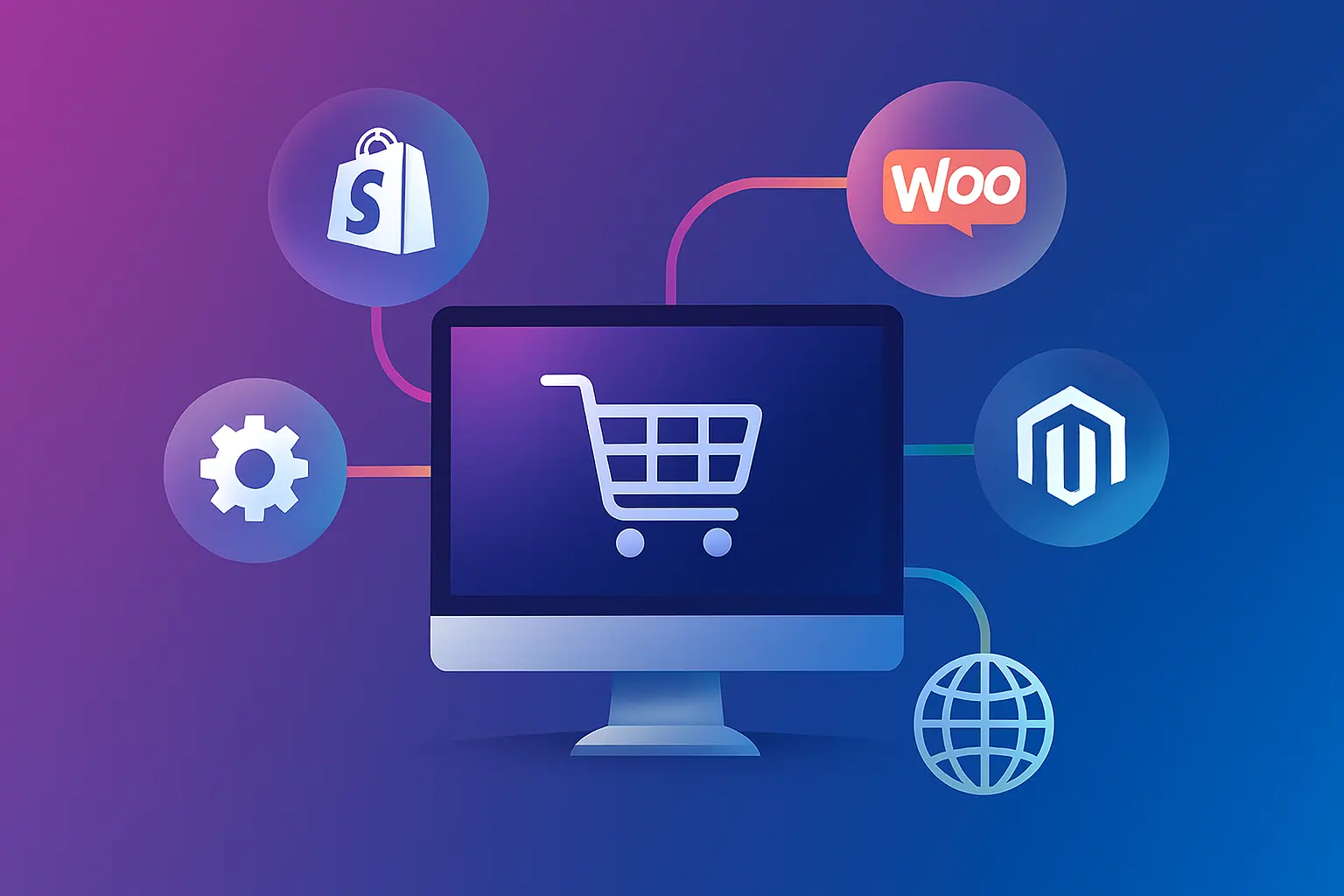Generative AI in eCommerce: Use Cases, Implementation & Tools
- September 11, 2024
- 24 mins read
- Listen

Customer expectations are evolving rapidly. Since the pandemic, online shopping has become the norm, with shoppers expecting the same quality of experience they receive in physical stores. While this shift has fueled growth in eCommerce, it also brings significant challenges. Businesses do struggle to manage extensive inventories, offer personalized shopping experiences, create compelling content, and respond promptly to customer inquiries.
Fortunately, as eCommerce advances, so do the technologies that address these challenges. Generative AI—is one such game-changing technology that’s not just addressing these pain points but transforming them into opportunities for growth. This technology is revolutionizing the online shopping experience, by offering innovative virtual shopping experiences and creative product ideas that customers love.
In this blog, we will explore how generative AI is reshaping the eCommerce landscape and its tremendous potential, highlighting the benefits it offers to brands and how they can implement it effectively. We’ll also review the top five generative AI platforms, explore practical use cases, and discuss the key challenges. Sounds interesting? Keep reading to learn more.
What is Generative AI in eCommerce?
In simple terms, Generative AI in eCommerce is the usage of artificial intelligence technologies to create different attractive content, data, or designs that enhance the various aspects of the online shopping experience.
This type of AI is called “generative” because it can produce different types of unique outputs rather than just merely analyzing or categorizing existing data. Generative AI is a specific form of AI that uses machine learning technologies to create different images, data, and videos. In the eCommerce industry, generative AI works wonders in different segments such as developing personalized content, product recommendations, product descriptions, and special product or service-related videos for customers.
In a comprehensive study, Gartner made a notable prediction about the future of this evolving technology. They projected that by 2030, generative AI will be responsible for generating 30% of outgoing marketing messages, a significant jump from only 2% in 2022. This shift is expected to make the global AI market, valued at $207 billion, quite an attractive field for investors.
8 Ways Generative AI is Transforming the eCommerce Industry
As times change, the eCommerce industry continually adopts new technologies to remain competitive and provide additional value to customers. Generative AI, powered by advanced machine learning (ML) technologies, has become a hot trend among key stakeholders, including solution providers and new entrepreneurs. eCommerce businesses are now actively exploring the various opportunities that generative AI can bring to the industry.

Generative AI is undoubtedly here to stay. Let’s take a closer look at how it is transforming the eCommerce landscape.
1. Customized Recommendations and Targeted Marketing Approaches
With advanced technologies, Generative AI can evaluate several customer data like buying records, browsing patterns, geographic locations, and social media activities to offer personalized recommendations for every customer. We all love specially curated services, and such takes always create a strong likeliness among customers leading to better experience and sales conversions.
Let’s take the example of Netflix. To use Netflix, we need to create our own profiles. By checking what we watch, Generative AI suggests some more good shows and movies that match our preferences and choices. Isn’t it great?
2. Visual Search and Virtual Fitting Technologies
Visual search is a fantastic feature to try. You can upload an image of a product you like, and generative AI will help you find similar items in the company’s catalog. This way, you don’t have to spend time browsing through thousands of products; you can easily find what you’re looking for.
Myntra is one eCommerce brand that offers this feature. Simply upload an image of the product you’re interested in, and Myntra will display all the available items that resemble your uploaded photo.

3. Automated Content Creation
With generative AI, brands can automatically create various types of content, including product descriptions, captivating images, videos, posts, and catalogs. You won’t believe how engaging this content is. By analyzing different content patterns, generative AI produces highly compelling content much faster than humans can.
Additionally, generative AI can be used to craft content and engaging posts for various marketing campaigns and social media platforms and trust me they don’t even sound robotic. Big eCommerce brands like Alibaba is already using AI to produce descriptions for the millions of products listed on their website. The AI-generated content is not only detailed and well-crafted but also provides customers with comprehensive information about each product.
4. Dynamic Pricing with Generative AI
Generative AI analyses the ongoing market trends, competitor pricing, and outside influences like weather, upcoming festive seasons, etc that may affect the pricing, customer preference, buying behavior etc. Based on this info, it transforms the pricing models in real time. This allows eCommerce brands to optimize their pricing structures to get the best results.
Let me give an example here for your better understanding. Many industries including the airlines are following this practice. If you can the flight ticket charges are getting changed very frequently due to different factors like booking times, holidays, travel seasons, market conditions, or any other time when the flight demand is high. All these pricing transformations are automated and based on predefined factors.
More and more eCommerce businesses have started using Generative AI technology to optimize their overall revenue and offer competitive pricing to their customers.
5. Streamlined Supply Chain Management
Supply chain management involves handling inventory, processing orders efficiently, and forecasting product demands. Doing all this manually is challenging, but generative AI can streamline the process. With its advanced algorithms, generative AI can analyze various factors such as weather forecasts, market trends, customer demands, and sales patterns to provide accurate sales predictions. This information allows eCommerce brands to manage their inventory more effectively, ensuring products are always available when needed, delivered on time, and that other operations run smoothly.
A great example of using AI to manage extensive operations is the eCommerce giant Amazon. It utilizes generative AI to handle inventory management, plan shipping routes, optimize distribution channels, and streamline other business operations to offer the best to its customers.
6. AI-Powered Chatbots and Customer Service
Customers prefer instant assistance and brands that can offer this always stay ahead of the competition. But as the customer service department gets flooded with thousands of customer queries every day, replying to those through live chat, phone calls or emails sometimes can be challenging. As a human, one agent cannot manage too many customers at a time. AI chatbots can automate the whole process by interpreting customer queries and offering accurate answers.
Also, as Generative AI evaluates customer behavior, their buying patterns, past chats, etc it can offer personalized assistance to the customers thus improving their overall shopping experiences. In addition to that, with chatbots, you can offer 24/7 customer support even after your business hours. This ensures that customers, regardless of their location, receive instant help whenever they need it.
7. Innovative Design and Product Development
Generative AI can also contribute to the innovation and creation of visually appealing images, product catalogs, and videos by helping designers develop new, thoughtful concepts. Using the basic design parameters provided by designers, it can generate a variety of new concepts. Designers can use these AI-generated design concepts as inspiration to create something new for the brand.
Also, Generative AI tools can create detailed prototypes of products or components based on specific requirements. These prototypes can include 3D models, animations, and virtual representations that help designers visualize the end product early in the development process. This automation reduces the time and effort needed to produce prototypes, making it easier to iterate and refine designs quickly.
8. Security Enhancements and Fraud Prevention
Generative AI plays a crucial role in fraud detection by analyzing vast amounts of data to identify patterns and anomalies indicative of fraudulent activities. With powerful algorithms, these AI platforms can check and evaluate a large number of financial data in real-time and detect any unusual activities if happen with accuracy.
For example, in eCommerce businesses where large monetary transactions occur daily. Generative AI monitors all transactions and if it identifies unusual spending patterns from unknown sources it alerts companies to potential security breaches, helping them respond quickly to protect their operations and customers.
How to Implement Generative AI in Your eCommerce Business
The opportunities that Generative AI is providing are really enticing but it can only be able to deliver its best if you can implement it correctly in your business strategies. To assist you, we have outlined the seven best ways to implement AI platforms in your eCommerce business.

1. Identify Goals and Relevant Use Cases
Firstly, decide what your eCommerce brand wants to achieve through Generative AI. List down your business goals and plan the key target applications (use cases) where you want to apply AI. This could be:
- Better customer engagement
- Personalized product recommendations
- Managing all your inventory and logistics effectively
- Creating and optimizing attractive content
- Offering best-in-class customer service and so on.
2. Gather and Prepare Data
To make the AI model work effectively you need to train it. Gather all the required data like customer preferences, choices, previous interactions, buying behavior, sales data etc and configure those to your Generative AI platform that can be used.
Pro Tips:
- First plan which data is essential for your AI models based on your business goals. This could include customer purchase history, buying behavior, order history, product details, inventory data, customer reviews and so on.
- Use multiple data sources, such as your eCommerce platform, CRM system, social media platforms, and third-party data providers, to gather comprehensive information.
- Clean your data to remove duplicates, errors, or inconsistencies that could negatively affect your AI model’s performance.
- Properly label your data to make it meaningful and easily understandable by the generative AI models.
3. Choose an Appropriate Generative AI Model
Choose the Generative AI tools and platforms that best match your business needs and technical capabilities. While selecting the right one for your business, consider factors like ease of integration, features, scalability, cost, and support options.
The right foundational model will depend on your specific use case, the type and quality of your data, and the capabilities of your business infrastructure. Different technologies are for different requirements; for example, Generative Adversarial Networks (GANs) are ideal for generating images, while models like GPT are better for text-based applications.
It’s also important to note that generative AI tools are not inherently compliant with industry-specific regulations. To ensure the safety of your customer data, historical sales data, and other sensitive information, you must select the appropriate training and deployment methods.
Pro Tips:
- Research and compare AI tools and platforms to choose the best fit for your eCommerce brand.
- Evaluate whether you need a custom solution or a ready-made platform.
- Begin with a small and manageable project to test the effectiveness of generative AI in your business.
- Ensure that all your data is correct and relevant, to achieve accurate and meaningful outcomes.
- Implement strong security measures and comply with relevant data privacy regulations to protect your data and maintain customer trust.
4. Fine Tune the AI Model
You need to start the training process once the data has been collected and preprocessed. It involves an iterative process of adjusting the model architecture, hyperparameters, and training algorithm to find the optimal setup for stable and secure performance. After training the model, it’s important for you to regularly monitor and assess its performance and make necessary adjustments if required based on periodic testing results.
Pro Tips:
- Ensure your data is well-prepared, clean, and preprocessed to enhance the AI model’s learning process.
- Begin with a simple model architecture to establish a baseline performance.
- Keep a close eye on key training metrics such as loss, accuracy, and validation performance.
- Experiment with different model architectures, algorithms, and hyperparameter settings to find the best configuration.
5. Integrate with eCommerce Platforms
Once the testing is done, the next step is to integrate it into your eCommerce architecture. This could involve connecting the AI tools with your CRM, CMS, or inventory management system. Depending on your business objectives, you may need to deploy the model to a cloud-based service, develop a dedicated interface, or connect it with your eCommerce business’s documents and knowledge databases. After deployment, it’s important to continuously monitor its performance to ensure it meets your expectations.
Pro Tips:
- Develop a detailed integration plan with timelines and responsibilities.
- Test the integration thoroughly to ensure smooth operation.
- Check for any technical challenges and ensure that the data flow between systems is secure.
6. Track Performance and Assess Results
Consistently monitor and note the performance of your generative AI model by evaluating its effect on many key metrics like conversion rates, customer satisfaction, and revenue. You need to make adjustments in the model, or its implementation based on its performance and changing business requirements. Remember, AI models rely heavily on the quality of the data they use, so it’s essential to fine-tune data patterns to avoid model drift. So update the model as needed.
At times, you may need to retrain the model, while in other cases, implementing new monitoring processes can also work. As your eCommerce business expands, ensure the model scales appropriately to meet growing demands.
Pro Tips:
- Implement automated monitoring tools to continuously track the performance of your AI model.
- Conduct A/B tests to compare the performance of the AI model against other versions.
- Regularly check the quality of the data feeding into your model.
- Set clear benchmarks for what constitutes success for your AI model based on your business objectives.
7. Maintain Data Security and Regulatory Compliance
Be careful of data security and regulatory compliance, particularly when handling customer data. Put in place all the necessary safeguards to protect sensitive information. To ensure data security and regulatory compliance when integrating generative AI into your eCommerce business, begin by identifying the relevant data protection regulations, such as GDPR, CCPA, or PCI DSS. Perform a Data Privacy Impact Assessment (DPIA) to find out any risks related to data processing. Implement robust encryption for all kind of data to safeguard sensitive information.
Pro Tips:
- Conduct frequent security audits to identify vulnerabilities in your AI systems and data handling processes.
- Ensure that only those who need the data for their work can access it.
- Data protection regulations frequently change, so stay informed about the latest updates.
- Have a robust incident response plan in place for potential data breaches.
Use cases of Generative AI in eCommerce
Generative AI has the potential to enhance or even replace various elements of a company’s eCommerce workflow. In the eCommerce sector, AI benefits everyone related to the business- vendors, employees, customers, and prospective buyers.
From creating personalized product recommendations to enabling virtual try-ons, generative AI is reshaping the way we engage with online stores and how eCommerce brands meet our needs. Here are some of the use cases to show you generative AI is making an impact in the eCommerce industry.
Generating Various Content
eCommerce stores need compelling and descriptive text to effectively inform, showcase, and attract customers about their products. Generative AI models equipped with advanced natural language processing and understanding can create captivating product descriptions. For instance, content writers can generate relevant, engaging, and grammatically correct content by inputting basic product details and the brand’s tone into these AI tools.
Creating Product Images
Generative AI, particularly those utilizing generative adversarial networks (GANs), enables marketers to produce distinctive product images for their product catalogs, and advertising campaigns. As a leading innovator in the AI field, Meta has recently launched AI Sandbox. Although it’s still in its early stages, this initiative allows Meta to work with publishers to experiment with different AI tools for automating ad creation.
Virtual Try-Ons
Virtual customer experiences, such as virtual try-ons for clothing, accessories and makeup, are rapidly expanding and building a dedicated customer base. While clothing retailers are reaping the most benefits from this advancement, other segments are also using this feature to offer something better to their customers.
Additionally, a growing number of customer-facing apps now integrate various generative AI features, such as AI assistants, chatbots, guided search, and personalized product recommendations, to enhance and streamline the shopping experience for users.
Designing New Products
eCommerce businesses need to add new and attractive products to their catalogs to adapt to shifting trends in the market and customer needs. Generative AI makes this process easier. For example, by using AI tools such as Midjourney, DALL-E, or Stable Diffusion, they can generate new product concepts just by providing descriptive text prompts.
Better Management of Inventory
Generative AI offers clear insights into logistics and inventory management. Such info helps store managers to make data-driven decisions on how to stock the products based on demands and manage the delivery process. By analyzing various sales data, forecasting short-term and long-term demand, and evaluating customer sentiment, the AI model enables more precise inventory adjustments. This allows eCommerce retailers to manage stock efficiently and seize opportunities for on-demand products.
Data Analytics
Since everything is online in the eCommerce business, it often faces challenges in measuring customer satisfaction. Due to the lack of direct, face-to-face interaction compared to traditional brick-and-mortar store, online brands face challenges in understanding customers’ perceptions of their product offerings.
Although online businesses have utilized data analytics tools for years to gain insights into customer engagement, these tools have typically been constrained by the volume and quality of data they collect, as well as the speed at which data is updated. In contrast, Generative AI-driven data analytics tools provide business leaders with more contextual and real-time customer data from various sources.
These tools can capture data from diverse formats, such as customer service interactions, customer buying behavior, social media posts, and comments, ad clicks, engagements etc.
Lead Management
Lead retargeting and nurturing can be time-consuming due to the need for multiple follow-ups. Generative AI helps in lead management as well.. Through personalized interactions with the customers, these AI tools motivate them to complete their purchases. This technology streamlines the engagement process, making it more efficient and effective.
Top 5 Generative AI tools for eCommerce
There are different advanced Generative AI tools available for eCommerce that can greatly benefit online storefront retailers. What kind of AI tools your brand needs depends on which aspect of the business you want to improve—whether it’s content creation, designing product recommendations, customer service, targeted advertising, operational efficiency, or customer data analysis.
Sounds confusing? Don’t worry! We will explore the top 5 options for your consideration.
1. REVE Chatbot
REVE Chatbot is an omnichannel generative AI solution offered by REVE Chat that lets you automate many of your business operations including customer service for your online store, mobile app and other social media channels like Facebook, Viber, Instagram, Telegram and WhatsApp.
If you have less manpower to handle a huge amount of customer queries or want to offer round-the-clock customer service even after your business hours REVE Chatbot can step in to manage everything efficiently. It provides instant and accurate responses to customer queries and can also manage other tasks such as inventory control, marketing campaign creation, and product carousels for your online store.
Key Features:
- Customer Service FAQs
- Sentiment Analysis
- Fall Back Option
- Bot Analytics
- Data Sanitization
- Visual Flow Builder
- Seamless Human Handovers
Curious to see how REVE Chatbot works wonders in your online store? SIGN UP for its 14-day FREE TRIAL today.
2. Typeface
Typeface is an AI content platform that can help eCommerce brands generate personalized, on-brand content at scale using specialized AI marketing agents. The Web Agent, for instance, helps plan and create content for blog posts, case studies, and web pages. The Email Agent designs complete email journeys, Ad Agent generates digital and social ads, while the Video Agent helps in creating and repurposing videos for your marketing channels.
Built for enterprise-grade retailers, this generative AI platform transforms how businesses produce marketing materials by ensuring brand compliance while scaling personalized content across all channels.
Key Features:
- AI-powered brand assistant
- Multi-modal content generation
- Content personalization for various audience segments
- Workflow management
- Integrations with data platforms, CMSs, and DAMs
3. Kili
Kili is a platform that uses generative AI technology to enhance various aspects of digital content creation and data processing. Kili is an AI-powered personalization tool that enables eCommerce brands to create customized shopping assistant for their customers.
This virtual assistant enhances the shopping journey by simplifying product searches from a vast collection of product images, thereby improving the overall shopping experience and increasing sales conversion rates.
Key Features:
- AI-powered content generation
- Personalized shopping assistant
- Adaptive learning
- Custom model training
- Integration capabilities
- User-friendly interface
4. CopyMonkey
With the help of advanced AI technology, CopyMonkey generates engaging and high-quality product descriptions, headlines, and other marketing copy. This tool assists online businesses in crafting optimized, AI-powered Amazon listings within seconds. By utilizing AI-generated images, videos, personalized emails, and other media, your online business can enhance the performance of its product listings, resulting in greater visibility and increased sales on the Amazon marketplace.
Key Features:
- AI-generated multimedia content
- AI-powered listing optimization
- Customizable content templates
- Incorporates SEO best practices
- Integration with eCommerce platforms
5. Aidaptive
Adaptive is a generative AI tool designed to enhance customer experiences and engagement through personalized content and interactions. Being an AI-powered customer analytics and eCommerce personalization platform, it enables businesses to gain deeper insights and deliver personalized experiences to each of their customers. Utilizing machine learning algorithms, Aidaptive analyzes customer data to provide actionable insights and enhance AI-driven marketing automation strategies.
Key Features:
- Customer data analysis
- Automated marketing
- Real-time insights
- Multi-channel integration
- User-friendly interface
- Personalized shopping assistant
Factors to Consider While Choosing a Generative AI Tool for Your Business
From text and image generation to managing inventory and delivery, Generative AI offers a vast array of functionalities for the eCommerce business. However, with so many features and functionalities available, it sometimes becomes challenging for eCommerce brands to understand and choose the most suitable Generative AI tool for their businesses. To guide you here, we have listed the key considerations to look for while choosing the right Generative AI platform for your online brand.
Cost and Budget Considerations
When selecting the Generative AI solutions for your eCommerce brand, make sure you evaluate the pricing model carefully to ensure it suits your budget. Many leading AI tools provide options like monthly or annual subscriptions, while others offer pay-as-you-go plans or tiered pricing based on your usage levels.
Flexibility and Scalability
Always look for and choose an AI solution that can be customized to meet your business’s evolving needs and growth. Make sure the tool you select can be easily personalized to match your specific requirements. Additionally, the AI tool should be able to scale itself with your business as your customer base and demand grow and support your journey to becoming a leading eCommerce company.
Compatibility with Existing Systems
Always opt for a Generative AI tool that seamlessly integrates with your existing eCommerce platform, CRM, email marketing platform, social media platforms and other business infrastructure. Smooth integration ensures that the AI tool is working fine with your current technology stack, making data synchronization effortless and optimizing your customer service processes.
User-Friendliness and Simple Setup
Opt for a generative AI tool that is intuitive and easy to set up, even for users without any technical knowledge. This will help reduce the time and effort needed for implementation and training the bot. This will help your team to focus on delivering exceptional customer service with greater eCommerce personalization.
Moreover, make sure that the AI platform provider is offering adequate support and resources, such as comprehensive documentation and active community forums. Those should help you throughout the setup and use of the AI platform if required.
Data Protection and Security
Choose AI tools that follow industry-standard security protocols, including encryption and secure data storage. Also, make it a point to verify that the tool complies with applicable data protection regulations, to protect your customers’ information and make them feel safe with your brand throughout their online journey.
Limitations of Generative AI
Generative AI is a transformative technology with the capability to revolutionize nearly every aspect of our lives. In the context of eCommerce, it can handle a wide range of tasks, including writing blog posts, crafting product descriptions, creating product catalogs, generating images and videos, and even assisting with inventory management, to name a few. However, this makes us also think about its limitations—what exactly are the boundaries of generative AI? Let’s explore this in this section.

Generative AI Systems May Hallucinate
As a retailer, it is a nightmare if you alienate your customers, but that risk exists with current generative AI technology. These systems aren’t always reliable and can occasionally generate inaccurate or fabricated information, a limitation often highlighted in disclaimers. Without continuous and thorough human review, the results from generative AI may not always be dependable.
Risk of Data Security
As Generative AI technology extensively collects and processes consumer data, there are concerns related to data security and privacy. Mishandling or unauthorized access to sensitive customer information can lead to privacy law violations, legal penalties, and damage to a company’s reputation. To safeguard customer trust and minimize security risks, companies need to implement robust data protection measures and comply with data privacy regulations.
Lack of Transparency
Grasping the logic behind AI-generated results or the decision-making processes can be difficult, as they often function as “black boxes.” There are trust issues with their final outputs. To encourage acceptance of Generative AI systems, it is important to improve their interpretability and transparency.
Generative AI is still in the process of getting more polished and advanced, and there are several technical and practical challenges that need to be resolved. However, it holds the potential to produce realistic and diverse data across various domains. As technology advances and training datasets improve, generative AI is expected to become even more powerful in the future.
Future of Generative AI in eCommerce
Experts predict that Generative AI will not only make business operations more efficient but also play a key role in strategic decision-making within the eCommerce industry. As AI algorithms continue to become more advanced and refined, businesses can expect to deliver more personalized and engaging customer experiences. Here are a few points to look into for understanding the future of Gen AI in eCommerce.
- Combining AI with Augmented Reality (AR) and Virtual Reality (VR) technologies will enhance the overall shopping experience of customers by making it more engaging and interactive.
- Generative AI will be able to accurately analyze larger volumes of customer data to develop highly personalized marketing strategies for eCommerce brand.
- By predicting demand more accurately, optimizing inventory, and detecting potential supply chain disruptions before they occur, this technology will significantly improve supply chain management efficiency.
- Generative AI will help businesses to produce more detailed and captivating product visuals and prototypes quickly, without lengthy preparation times.
- In-store experiences are expected to be transformed with AI capabilities, blending the convenience of online shopping with the tangible benefits of physical brick-and-mortar stores.
- AI-powered customer analytics and behavior prediction models will utilize big data more effectively than ever before, enabling online retailers to predict market trends with better accuracy.
Furthermore, as generative AI continues to develop, its ability to create high-quality, cost-effective content will allow small and medium-sized online enterprises to compete with larger companies.
And It’s a Wrap!
The dynamics in the retail eCommerce industry keep on changing due to various factors like evolving customer expectations, upcoming market trends, increased online competition, price sensitivities, etc. In such a case, eCommerce brands keep on exploring new and advanced technologies that can help them to cope up with such situations and boost sales with minimal time and investment.
Generative AI offers immense potential, particularly in the retail and eCommerce sectors. With personalized customer service, creating various new concepts related to product content, improved operational efficiency, and enhanced customer experiences, Generative AI is all set to shine in the eCommerce segment.
By leveraging advanced algorithms, businesses can provide tailored recommendations, facilitate intuitive visual searches, and implement dynamic pricing strategies, driving higher engagement and conversion rates. Here in this blog, we have discussed everything about Generative AI to help guide your AI strategy in the right direction. Was this information useful for you? Share your thoughts in the comments below!
Frequently Asked Questions
Generative AI offers a range of applications for your eCommerce business that can enhance efficiency, personalization, and customer experience. This includes creating product recommendations, catalogs, images, and videos. virtual try-on, content, chatbots for customer service, automated ad campaigns etc.
Generative AI can automatically generate unique, engaging, and SEO-friendly product descriptions by evaluating your product features and target keywords. This helps to save time by eliminating the effort to write long descriptions of each of your products uploaded on your website and ensures consistency across a large inventory.
Very soon Generative AI is expected to generate more accurate and diverse data. With ongoing improvements in the latest technologies and better training datasets, generative AI is all set to come up with its advanced versions. Increased accuracy and diversity, greater personalization, improved accessibility, are some of the advancements that we can expect.
There may be initial costs related to implementing and training the generative AI tools. However, they can be cost-effective in the long run by automating various repetitive tasks, improving accuracy, business management, customer service and customer engagement.
Generative AI will assist employees in online businesses by enhancing various operations rather than replacing them. It can automate many repetitive tasks, other business operations and offer valuable insights. This will help the teams to concentrate on more strategic and creative aspects of the business for overall improvement and to give something special to their customers.




